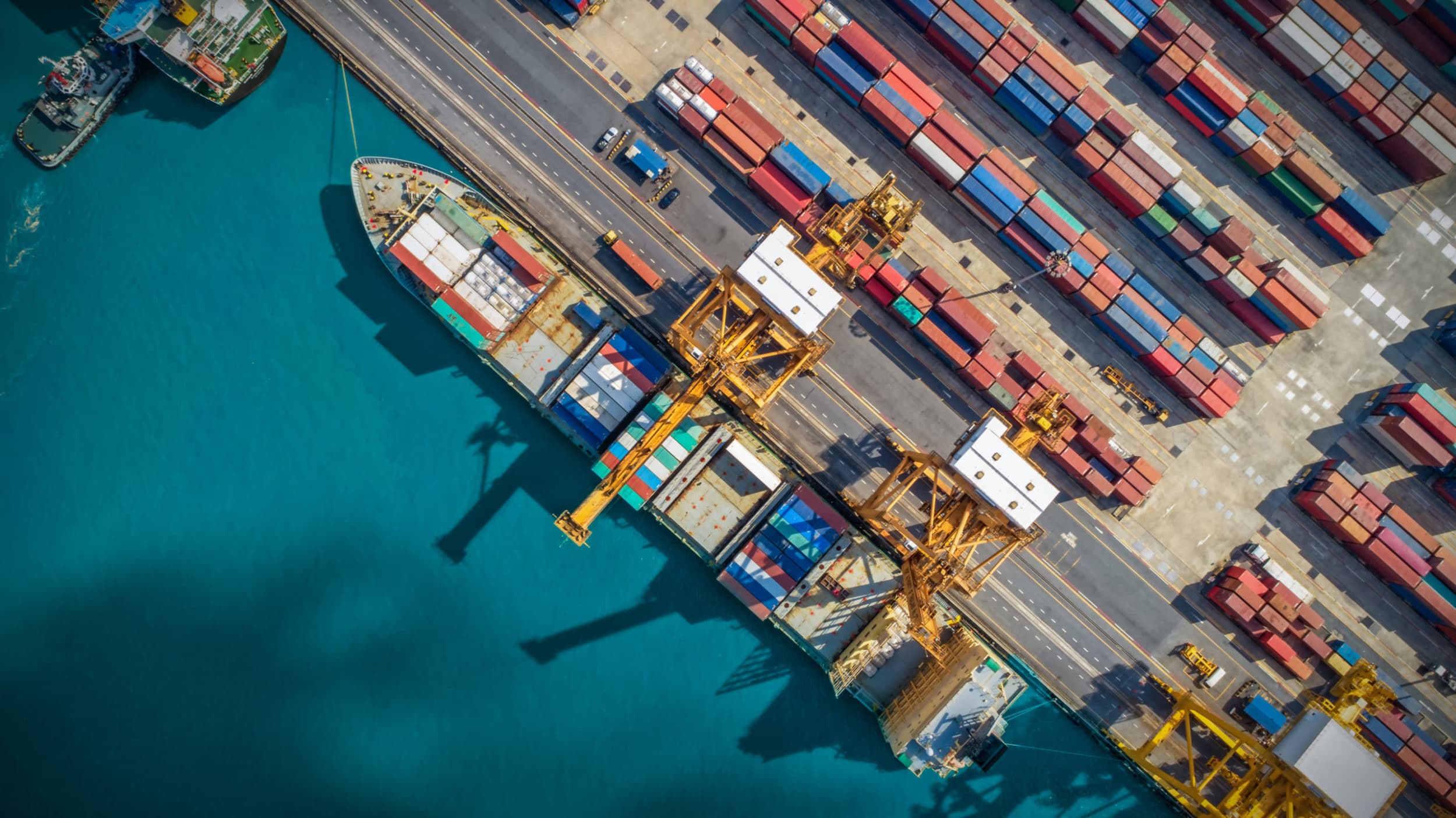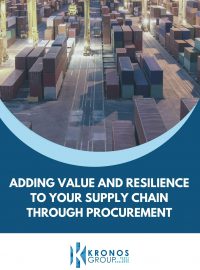Global supply chain resilience and procurement consulting

Summary:
Supply chain resilience refers to your company’s ability to withstand a crisis and return to efficiency, post-crisis. While resilience is a critical characteristic of every business operation, it is especially important to support vulnerable business processes such as supply chain management.
Procurement consulting expertise has the ability to help businesses withstand crises and leverage cutting-edge innovation and streamlined processes to create sustainable business transformation.
Creating supply chain resilience is especially critical post-crisis. Post-COVID-19, procurement consulting is likely to focus more on the following factors:
Sustainable practices: Taking responsibility for your company and your impact on the environment helps secure your business’ future. This involves taking steps to conserve resources and ensure environmental consciousness.
Ethical procurement: This includes the treatment of labour within a company and supplier ethics. The ethics of a business is likely to be subject to closer scrutiny, post-crisis.
Crisis management: The crisis is likely to alert businesses to the value of thorough crisis management and recovery plans, especially given the vulnerability of their supply chains.
Discover the role procurement consulting is set to play in the business landscape, post-COVID-19, with Kronos Group.
Business resilience is a phrase that has been used often, most recently in the wake of COVID-19, with little to no direction on how this can be achieved. At Kronos Group, we have identified that procurement consulting is a highly effective way of achieving this resilience.
To start at the beginning, the scientific definition of resilience refers to the ability of a material to absorb shocks and undergo deformations and still return to its original form.
In the world of business, it is pretty much the same thing.
It refers to a company’s ability to undergo crises, challenges, and “deformations”, and still return to its original “shape”, function, processes, and efficiency.
A resilient business can absorb disturbances and reorganise the business model to retain its function, structure, and business identity (The Science of Resilience, resilience.org).
What is supply chain resilience?
The supply chain is a vulnerable part of your business. This vulnerability stems from the fact that it comprises a line of suppliers, perhaps even from varying markets and industries, who must navigate their own challenges and product life cycles.
Your supply chain, therefore, depends mainly on external factors that cannot be controlled by your business’ internal processes or efficiency.
This makes your business reliant on the measures you have in place to protect your operations in the event of a crisis. It also complicates your ability to manage and respond to crises while alleviating the long-term effects on your business.
Supply chain resilience is necessary because threats to your supply chain are numerous.
Natural disasters, accidents, and a multitude of other disruptions contribute to the escalating global issues of shrinking product life cycles, and increasingly volatile markets. Apart from these challenges, which may be unexpected but not completely unprecedented, there are also high-impact/low-probability events, like COVID-19, that are outliers to any other crisis experienced in recent memory.
The absence of reliable and actionable data of these events excludes the use of predictive statistical tools to help contain these risks (Paul Michelman, August 14, 2007, ‘Building a Resilient Supply Chain’, Harvard Business Review).
Predicting these crises, let alone responding to them, then becomes a more pressing challenge. A challenge that only the quality of business resilience and the expertise of procurement consulting can conquer.
Resilience in a world post-COVID-19
Resilience reappeared at the forefront of critical business qualities in the wake of COVID-19, when companies struggled to grapple with the new disease and the numerous challenges and uncertainties it brought with it.
Resilience has become an indicator of the likelihood of a business’ long-term survival and overall success in both the short- and long-term.
The far-reaching, long-lasting consequences of the global health crisis alerted individuals, and the business world, to the fact that the systems we had in place were not suited to bend, and not break, under the pressures of a pandemic of this magnitude.
The global supply chain is a noteworthy example of this vulnerability.
When the COVID-19 crisis first emerged, it was clear that supply chains in every industry would need to do their part to support crisis relief efforts and alleviate the pressures on healthcare and all other businesses.
What occurred, instead, was a breakdown in the global supply chain that was rooted in both economic and diplomatic clashes.
COVID-19 diagnoses directly impacted the workforce and forced businesses to downscale or shut down operations permanently or temporarily. As a result of widespread globalisation, companies that weren’t critically hit by the disease, but still relied on foreign nations that were hit harder by the crisis, still experienced a breakdown in critical supply chain operations.
In addition to these factors, the threat of infection caused further panic and mismanagement of supply chain operations leading to lengthy interruptions and breakdowns in the supply of necessary goods and services all over the world.
Yet another factor to consider on the subject of post-COVID-19 resilience is the shifting priorities of consumers, post-crisis.
What does procurement consulting look like post-COVID-19?
The elusive aftermath of COVID-19 has already been dubbed the “new normal”.
While not much can be gauged about the new normal as of yet, one thing is clear: there is a marked difference between pre-COVID-19 and post-COVID-19, and the new normal is the herald of a new age for individuals, businesses, nations, and economies alike.
With this new age comes a shift in priorities that we are yet to see fully realised. A few of the emerging priorities that businesses and procurement consulting will need to pay attention to in their supply chain optimisation for the future are:
Sustainable practices: Sustainability is the process of ensuring your business’ future by taking responsibility for your company and your product/service’s impact on the environment. This involves taking steps to protect resources and ensure environmental consciousness in every business venture for the sake of all those who depend on it.
Ethical procurement: Ethics in business has often been a highly contentious topic, with many claims of ethical practices and corporate social responsibility events rooted in bids for the company to be perceived more favourably in the community and boost profits, while maintaining unethical internal practices that contradict their outward-facing image.
Ethics include the treatment of labour within a company and the ethics of a business’ chosen suppliers. COVID-19 uncovered the risky, unhealthy working practices in many industries, and in the new normal of post-COVID-19, ethical business practices are likely to become a key priority.
Primed for crisis management: Post-COVID-19, businesses are likely to be more thorough in their crisis management and recovery plans, especially with regard to their vulnerable supply chains.
These are just a few of the priorities we can recognise at this stage of the crisis. There is no doubt that the next few months, and the measures taken by nations and economies all over the world, will have a major impact on the world we have already dubbed the new normal.
Navigating these next steps, and preparing for an uncertain future, is a risky manoeuvre for any business regardless of how established they are in the industry or how much success they have enjoyed over the years.
This is where procurement consulting comes in.
Procurement consulting and its pivotal role in building global supply chain resilience
While supply chain resilience is defined by a business’ ability to retain its original form, following a major disruption, we, at Kronos Group, believe that resilience is about a business’ ability not just to survive—but thrive in the face of a crisis and leverage key business measures to emerge from a crisis stronger than ever before.
No business or nation has experienced anything of the same magnitude as COVID-19. The clashing opinions and strategies each business and nation took when fighting the crisis is an indicator that the road to recovery, in the aftermath of the pandemic, is bound to be long and riddled with challenges.
What businesses need at this juncture is a long-term, sustainable plan that can extract a business from the throes of the crisis without compromising on short- and long-term objectives.
This focus on long-term, sustainable, and pragmatic recovery requires the unbiased view of a professional who can recognise the strengths and weaknesses of a business strategy without becoming invested in shortsighted business goals or a weak corporate culture.
That perspective can be accessed via a procurement consulting professional.
A procurement consultant has the ability to draw from their expertise in the field and their prior experience helping businesses achieve their efficiency and growth goals despite challenges and difficulties.
While these vulnerabilities cannot be fixed overnight, the recognition of factors that cause them, alone, makes it easier to approach procurement improvement and enhancement, post-crisis.
Procurement consulting empowers you to recognise the interwoven impacts of any crisis on your business and arm you with the tools, expertise, strategies, and solutions that will help you manage and accelerate the recovery of your business.
Perhaps most importantly, procurement consulting will help you develop necessary business resilience that will serve your company through a crisis and beyond.
Post-crisis, businesses will need to make a concerted effort to ensure the recovery of their industries. Procurement consulting will help synchronise these activities for greater, systematic success.
How can Kronos Group help you achieve supply chain resilience?
Here at Kronos Group, we are experts in procurement consulting, and in the fields of finance and project management.
Our procurement consulting professionals are given the dynamic opportunities and training they need to expand their expertise and improve the range of services we offer our clients.
All our services are aimed at adding the highest possible value to your business operations and imbuing your company with the necessary qualities for reliable, qualitative business growth—including resilience.
Kronos Group’s procurement consulting services include:
- Procurement maturity assessments
- Procurement transformation and spend management platform
- Procurement 4.0
- Procurement training
- Procurement outsourcing
- Spend optimisation
- Operations consulting
Get in touch with our team to support your business as it moves towards recovery and resilience.




